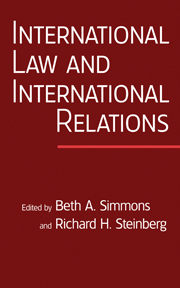Book contents
- Frontmatter
- Contents
- Contributors
- Abstracts
- Preface
- Editors' Note
- PART I INTERNATIONAL REGIMES THEORY: DOES LAW MATTER?
- PART II COMMITMENT AND COMPLIANCE
- PART III LEGALIZATION AND ITS LIMITS
- PART IV INTERNATIONAL LAW AND INTERNATIONAL NORMS
- PART V TREATY DESIGN AND DYNAMICS
- 13 Why Are Some International Agreements Informal? (1991)
- 14 The Politics of Dispute Settlement Design: Explaining Legalism in Regional Trade Pacts (2000)
- 15 Loosening the Ties that Bind: A Learning Model of Agreement Flexibility (2001)
- 16 Driving with the Rearview Mirror: On the Rational Science of Institutional Design (2001)
- 17 The Dynamics of International Law: The Interaction of Normative and Operating Systems (2003)
- PART VI LAW AND LEGAL INSTITUTIONS
- PART VII OTHER SUBSTANTIVE AREAS OF INTERNATIONAL LAW
- References
- Index
17 - The Dynamics of International Law: The Interaction of Normative and Operating Systems (2003)
Published online by Cambridge University Press: 05 June 2012
- Frontmatter
- Contents
- Contributors
- Abstracts
- Preface
- Editors' Note
- PART I INTERNATIONAL REGIMES THEORY: DOES LAW MATTER?
- PART II COMMITMENT AND COMPLIANCE
- PART III LEGALIZATION AND ITS LIMITS
- PART IV INTERNATIONAL LAW AND INTERNATIONAL NORMS
- PART V TREATY DESIGN AND DYNAMICS
- 13 Why Are Some International Agreements Informal? (1991)
- 14 The Politics of Dispute Settlement Design: Explaining Legalism in Regional Trade Pacts (2000)
- 15 Loosening the Ties that Bind: A Learning Model of Agreement Flexibility (2001)
- 16 Driving with the Rearview Mirror: On the Rational Science of Institutional Design (2001)
- 17 The Dynamics of International Law: The Interaction of Normative and Operating Systems (2003)
- PART VI LAW AND LEGAL INSTITUTIONS
- PART VII OTHER SUBSTANTIVE AREAS OF INTERNATIONAL LAW
- References
- Index
Summary
International law provides the framework for political discourse among members of the international system. The framework does not guarantee consensus, but it does foster the ongoing discourse and participation needed to provide conceptual clarity in developing legal obligations and gaining their acceptance. In playing this role, international law performs two different functions. One is to provide mechanisms for cross-border interactions, and the other is to shape the values and goals these interactions are pursuing. We call the first set of functions the “operating system” of international law, and the second set the “normative system.”
The purpose of this article is to describe the basic components of the operating and normative systems as a conceptual framework for analyzing and understanding international law. We also explore, in a preliminary fashion, the interaction of these two systems, specifically the conditions under which operating system changes occur in response to normative changes. We present a number of theoretical arguments and illustrate them by reference to the norm prohibiting genocide and the subsequent steps taken by states to change international legal rules so that this norm could influence state behavior.
[Most] scholarship has been devoted to how norms arise, with special attention to the moral character of the norm and how it becomes accepted broadly by the international community.
- Type
- Chapter
- Information
- International Law and International RelationsAn International Organization Reader, pp. 426 - 454Publisher: Cambridge University PressPrint publication year: 2007
- 1
- Cited by

